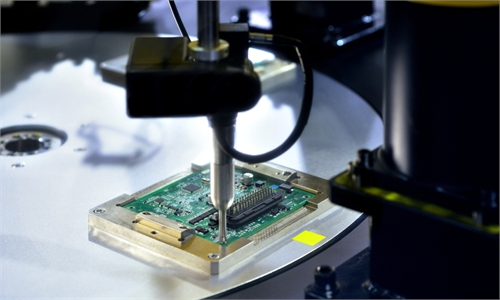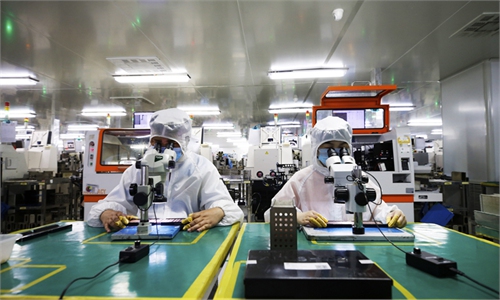Hopefully US semiconductor companies' 'petition' can awaken Washington: Global Times editorial

Photo:VCG
As rumors of the "Biden administration expanding chip export restrictions to China" grow, opposition within the US is also increasing. In a rare move, American semiconductor companies have launched a "petition movement." On July 17, CEOs of American chip companies such as Intel, Qualcomm and NVIDIA held talks with top US officials including Secretary of State Antony Blinken, Commerce Secretary Gina Raimondo, Director of the National Economic Council Lael Brainard, and National Security Advisor Jake Sullivan. They explicitly expressed opposition to US government's tightening of export controls on chips and semiconductor manufacturing equipment to China. On the same day, the Semiconductor Industry Association (SIA) issued a statement warning that restrictions on chip sales to China could backfire on the US.
Since October last year, when the US government initiated the chip blockade against China, described by The New York Times as "an act of war," American semiconductor companies have been expressing their opposition through various means. However, instead of taking them seriously, the US government has continued to escalate the blockade. It is widely rumored that new restrictions will be announced as early as the end of this month, representing a significant escalation from the export restrictions implemented in October last year. This has led to a concentrated outburst of dissatisfaction and concerns among American semiconductor companies. They are urging the Biden administration to refrain from taking this step and to stop imposing further restrictions on chip exports to China before the final "window of opportunity" closes. However, people have little confidence that the White House will listen and adopt their suggestions.
The joint action of the American industry is not accidental but rather a sign of a new stage in the so-called "chip war." It is evident that the US industry and Washington hold completely opposite attitudes on the issue of export controls to China. There can only be one side that is right, and it is obvious who is right and who is wrong. Ironically and absurdly, the US government initiated the chip blockade against China using the pretext of "national security" - a term that has been overused, and claimed to protect the interests of the domestic semiconductor industry. Whether it is "protection" or harm, the parties directly involved know best. Now they have provided an unequivocal answer, and it is harm.
China has long anticipated such consequences and has repeatedly warned the US. China is the world's largest semiconductor market, and the sales of American chip companies in China cannot be replaced by Washington's executive orders or some subsidies. Imposing crazy restrictions on exports to China will not only cause difficulties for the development of related industries in China but also harm the livelihoods of American semiconductor companies. It is truly a case of harming others without benefiting oneself.
As this is destined to be a war with no winners, there is significant controversy within the Biden administration. It is reported that one side, represented by Treasury Secretary Janet Yellen, hopes to minimize the scope of the impact. Yellen herself has repeatedly stated that the related restrictions will be "targeted" and "not broad controls that would affect US investment in China." However, these statements have not been transferred into tangible perceptions within the industry.
The SIA said in its statement that "the imposition of overly broad, ambiguous, and sometimes unilateral restrictions could reduce the competitiveness of the US semiconductor industry, disrupt supply chains, create significant market uncertainty, and prompt China to further escalate retaliation." On July 19, the China Semiconductor Industry Association also issued a statement, expressing its commitment, along with industry colleagues worldwide who are willing to cooperate, to safeguarding the globalization of the semiconductor industry. This resonance between the Chinese and American semiconductor industries demonstrates that the true pattern of mutually beneficial cooperation between the two countries' industries has been formed, which fundamentally contradicts the zero-sum competition narrative propagated by Washington.
There used to be a popular term in the US called "national security fortress," which referred to a country making decisions and viewing everything from the perspective of war and "national security," while sidelining market principles, rules and private sector. The US today is increasingly resembling a state living within a "national security fortress." This "petition movement" reflects that the differences and contradictions between the US business community, which represents economic interests, and the US national strategic elites, which represent political thinking, have reached a point of direct confrontation.
Once again, it is important to emphasize that the extreme suppression of China by the US may create trouble and difficulty that may harm the interests of both sides. However, it will not crush China, nor can it ultimately hinder China's development and technological progress. The cost that the US will have to pay for this is exceptionally high. American chip companies have already seen this clearly, and we hope that their "petition" will awaken some people in Washington.



